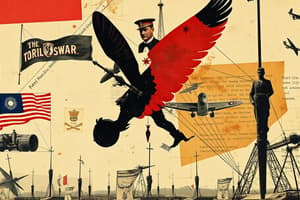Podcast
Questions and Answers
What is the definition of stalemate?
What is the definition of stalemate?
The situation in October 1914 in which German forces were determined to remain on French soil and Allied forces were unable to remove them.
How long were trench lines on the Western Front?
How long were trench lines on the Western Front?
780 kilometres
What factors created the conditions for stalemate?
What factors created the conditions for stalemate?
Failure of command, problems with communication and failure of war plans
What did the Allies discover through intercepted radio messages between September and November 1914?
What did the Allies discover through intercepted radio messages between September and November 1914?
Why were cable links significant in the German command structure?
Why were cable links significant in the German command structure?
What occurred regarding orders issued by the German High Command between 5-9 September?
What occurred regarding orders issued by the German High Command between 5-9 September?
What did the Schlieffen-Moltke Plan rely on?
What did the Schlieffen-Moltke Plan rely on?
What was the assumption of the Schlieffen-Moltke Plan regarding France and Russia?
What was the assumption of the Schlieffen-Moltke Plan regarding France and Russia?
What logistical issue slowed down the Schlieffen-Moltke Plan?
What logistical issue slowed down the Schlieffen-Moltke Plan?
What happened at the Battle of Mons?
What happened at the Battle of Mons?
What was the outcome of the Battle of Liège?
What was the outcome of the Battle of Liège?
What was the fatal decision for the German army that created stalemate?
What was the fatal decision for the German army that created stalemate?
What was the French war plan called?
What was the French war plan called?
What was the objective of the Schlieffen Plan?
What was the objective of the Schlieffen Plan?
What did David Stevenson say about the Schlieffen Plan?
What did David Stevenson say about the Schlieffen Plan?
What did David Stevenson comment regarding the 1st Marne?
What did David Stevenson comment regarding the 1st Marne?
What was the aim of the French war plan?
What was the aim of the French war plan?
When did the 1st Marne take place?
When did the 1st Marne take place?
When did the Battle of Mons occur?
When did the Battle of Mons occur?
When did the Battle of Liège take place?
When did the Battle of Liège take place?
Study Notes
Stalemate in WW1
- Stalemate defined as the situation in October 1914 where German forces remained on French soil, and Allied forces failed to dislodge them.
- Trench lines on the Western Front extended for 780 kilometres, illustrating the extensive nature of warfare.
Causes of Stalemate
- Conditions for stalemate resulted from failures in command, communication issues, and ineffective war plans.
- Intercepted German radio messages between September and November 1914 revealed their strategic intentions during the race to the sea.
Operational Challenges
- Lack of cable links between German commanders Kluck and Bülow delayed communication until 9 September, three days into the First Battle of the Marne.
- No orders were issued by the German High Command from 5 to 9 September, further complicating their operational capacity.
Schlieffen-Moltke Plan
- The Schlieffen-Moltke Plan depended heavily on timing, expected speed, surprise, and precise railway schedules.
- The plan presumed that France could be defeated in six weeks, and that Russian mobilization would take at least the same timeframe.
- The German army faced logistical issues, possessing only 4,000 lorries, with 60% breaking down before reaching the Marne.
Key Battles and Resistance
- At the Battle of Mons, the British Expeditionary Force (BEF) under Sir John French used Lee Enfield rifles effectively, causing Germans to believe they faced machine guns.
- The Battle of Liège faced unexpected Belgian resistance, resulting in a twelve-day delay and a bottleneck at a key fortress and rail link.
Critical Decisions
- The German army's decision to retreat to a defensive position following the First Battle of the Marne was pivotal in establishing a stalemate.
- The French war plan, Plan XVII, focused on retaking Alsace-Lorraine, lost during the Franco-Prussian War.
Contextual Dates
- The First Battle of the Marne occurred from 6 to 12 September 1914.
- The Battle of Mons took place on 23 August 1914.
- The Battle of Liège was fought between 5 and 16 August 1914.
Historical Perspectives
- Historian David Stevenson critiqued the Schlieffen Plan, stating, "They embarked on an adventure beyond their resources."
- He also noted about the First Battle of the Marne that "He could have secured a better situation by persisting."
Studying That Suits You
Use AI to generate personalized quizzes and flashcards to suit your learning preferences.
Description
Test your knowledge on the reasons for the stalemate during World War 1 with these flashcards. Explore key concepts, definitions, and the conditions that led to this crucial phase in the conflict. Perfect for history enthusiasts looking to deepen their understanding of WW1 strategies and challenges.




